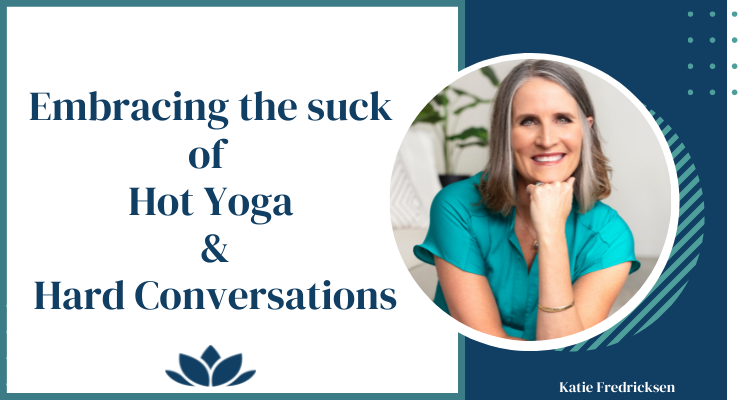|
I recently returned to hot yoga. I used to practice a lot. But habits change, pandemics happen and I stopped going.
I was hiking with a friend a couple of months ago and she was telling me that she had rekindled her hot yoga practice and was loving it. Her body craved it and she felt great. I felt inspired and decided it was time for me to return to class. My body, too, was craving more flexibility, and a little heat would help me to get there. This particular series that I know offers the same sequence of postures in every class. Because of that, I had a baseline of what I knew my body was capable of. On my first class back I found that I was still quite flexible in some ways. And not so much in others. The backbends were particularly hard and I found myself feeling discouraged by how much tighter I had become. And the heat! Wow, they are not messing around with that. Some days my face would be red for hours after class. It was hot, and uncomfortable. And I kept going back. After just a few classes I could see that my flexibility was returning. Each class I found more and more ease in my postures. And then one day, BAM! It felt like I was back to square one. Where had my flexibility gone? Why on this day was I suddenly feeling so stuck and brittle again? And at that moment, it occurred to me that practicing hot yoga is a lot like having hard conversations. Both hot yoga and hard conversations can feel difficult, uncomfortable, and awkward. In both, I want to be more graceful than I seem. And the more I practice, the more flexible I become. And some days, BAM! I feel like I’m starting over again! So, why do it then? Why not avoid it, or do something more comfortable? Because I know it's what’s needed. And it’s the right thing. With yoga, I embrace the discomfort because my back, my knees, my muscles are better for it when the class is over. Isn't it the same with hard conversations? The reason to have them is that there is an issue at hand that needs to be discussed, resolved, understood, confronted. There is a purpose for the conversation that guides us through the discomfort. And if we avoid it (the yoga or the conversation) then we have to endure something even worse - the potential inflexibility, pain, and struggle that comes from the toxic buildup in our bodies and relationships. Many of the clients that I work with tell me that their workplace has a “nice and polite” culture. Because of this they avoid having hard conversations with one another because they want to be nice and not hurt each other's feelings. I can understand the desire to be nice, and more damage can be done when we avoid the hard conversations. Resentment builds, gossip flourishes and problems persevere. We can still be kind to one another as we navigate the hard conversations. We can be clear and kind at the same time. And like hot yoga, it may not feel easy, but we can become more practiced, and flexible, and willing. What is something you've done that feels uncomfortable and necessary? Where you are willing to, as we say in Dare to Lead, “embrace the suck” because you know what’s possible on the other side?
0 Comments
Leave a Reply. |
AuthorKatie is a Certified Dare to Lead™ Facilitator and Executive Coach. Archives
September 2022
Categories
All
|
|
|
Get in touch
415-990-7970 | [email protected]
|
Virtual Dare to Lead | Organizational Transformation | Professional Development | Executive Coaching
About Katie | Dare to Lead | Resources | Contact
About Katie | Dare to Lead | Resources | Contact
|
© 2020 KatieFredricksen.com
Photos By: In Her Image Photography |


 RSS Feed
RSS Feed
